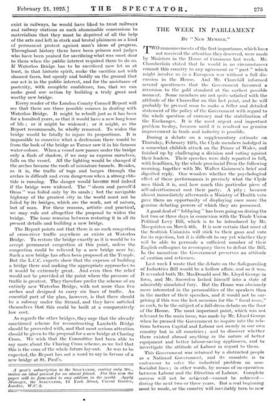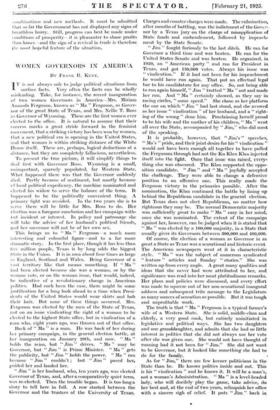THE WEEK IN- PARLIAMENT
By " NEW MEMBER."
TWO announcements of the first importance, which have not received the attention they deserved, were made by Ministers in the House of Commons last week. Mr.
Chamberlain stated that he would in no circumstances commit this country to any agreement or " pact " which might involve us in a European war without a full dis- cussion in the House. And Mr. Churchill informed several questioners that the Government favoured a reversion to the gold standard at the earliest possible moment. Some members are not quite 'satisfied with the attitude of the Chancellor on this last point, and he will probably be pressed soon to make a fuller and detailed statement of the policy of the Government with regard to the whole question of currency and the stabilization of the Exchanges. It is the most urgent and important problem to-day, because until it is resolved no genuine improvement in trade and industry is possible.
During a debate on a supplementary estimate on Thursday, February 12th, the Clyde members indulged in a somewhat childish attack on the Prince of Wales, and finished up by challenging a division and voting against their leaders. Their speeches were duly reported in full, with headlines, by the whole provincial Press the following morning, together with. Mr. Walter Guinness's brief and dignified reply. One wonders whether the psychological effect of these performances is precisely what the Clyde men think it is, and how much this . particular piece of self-advertisement cost their party. A pity ; because almost immediately afterwards a Ministry. of Health vote gave them .an opportunity of displaying once more the genuine -debating powers of which they arc possessed.
A good deal of " lobbying " has been going on during the last two or three days in connexion with the Trade Union Political Levy Bill, which is to be introduced by Mr_ Macquisten on March 6th. It is now certain that most of the Scottish Unionists will stick to their gulls and vote for its rejection, but it is difficult.to say yet whether they will be able to persuade a sufficient number of their English colleagues to accompany them to defeat the BilL In the meantime the Government preserves an attitude of caution and reticence.
Last week I wrote that the debate on the Safeguarding of Industries Bill would be a hollow affair, and so it was. It revealed both Mr. MacDonald and Mr. Lloyd George in form, and Mr. Snowden lashed himself into a state of admirably simulated fury. But the House was obviously more interested in the personalities of the speakers than in the matter of their speeches, and it would not be sur- prising if this was the last occasion for the " fiscal issue," as such, to be the subject of a full-dress debate on the floor of the House. The most important point, which was not relevant to the main issue, was made by Mr. Lloyd George when he pressed the Government to inquire into the rela- tions between Capital and Labour not merely m our own country but in all countries ; and to discover whether there existed abroad anything in the nature of better equipment and better labour-saving appliances, and to investigate the attitude of Labour in regard to them.
This .Government was returned by a distracted people as a National _Government, and its mandate is to endeavour to solve the industrial problem on non- Socialist lines ; in other words, by means of co-operation between Labour and the Direction of Labour. Complete, success will not be achieved—cannot he achieved— during the next two or three years. But-a real beginning: must be made,- or the country will inevitably turn to new combinations and new methods. It must be admitted hat so-far the Government has not displayed any signs of breathless hurry. Still, progress can best be made under conditions of prosperity—it is pleasanter to share profits than losses—and the sign of a revival in trade is therefore the most hopeful feature of the situation.











































 Previous page
Previous page